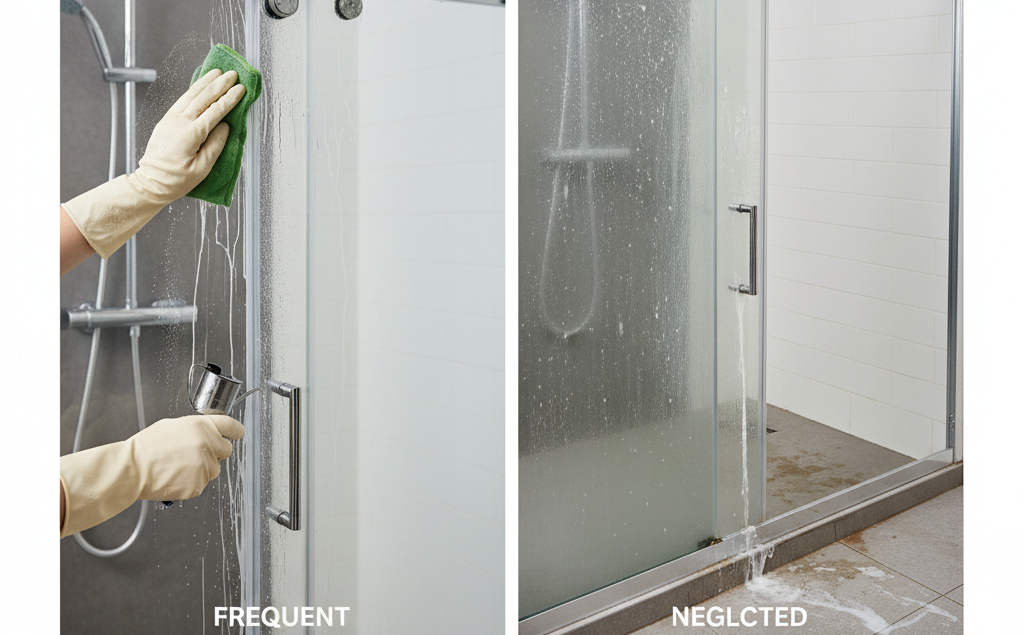How Often Should Sliding Shower Doors Be Serviced?
Sliding shower doors are a popular feature in modern bathrooms, combining functionality with sleek design. Their space-saving operation makes them particularly suitable for smaller bathrooms, while tempered glass panels add a touch of elegance to any décor. Despite their durability and low-maintenance design, sliding shower doors require periodic servicing to maintain smooth operation, prevent leaks, and extend their lifespan.
Regular maintenance not only keeps the doors looking pristine but also ensures the rollers, tracks, and seals continue to function optimally. Ignoring servicing can lead to sticking doors, water leaks, damaged seals, and even safety risks, especially when dealing with tempered glass panels. Understanding how often sliding shower doors should be serviced, along with proper techniques, can help homeowners protect their investment and maintain a beautiful, functional bathroom.
Why Sliding Shower Doors Need Regular Servicing
Sliding shower doors are subject to daily wear and tear. Moisture, soap scum, hard water, and dust can accumulate in tracks, rollers, and seals, causing doors to operate less smoothly. Over time, these factors may lead to corrosion of metal components or deterioration of rubber seals, which compromises both performance and safety.
Periodic servicing is essential for several reasons. First, it ensures that the sliding mechanism remains smooth and effortless, preventing the door from sticking or jamming. Second, it helps maintain water-tightness, preventing leaks that could damage floors or bathroom walls. Finally, regular checks allow homeowners to spot early signs of damage, such as worn rollers, bent tracks, or cracked seals, enabling timely repairs before the problem worsens.
Recommended Frequency for Servicing Sliding Shower Doors
Most experts recommend servicing sliding shower doors at least once every six months. This interval is sufficient for most households to inspect the doors, clean tracks, lubricate rollers, and check seals. However, homes with high water usage, hard water, or frequent shower use may benefit from quarterly servicing to prevent buildup and extend the door’s life.
In addition to scheduled maintenance, homeowners should be attentive to signs indicating that servicing is needed, such as difficulty sliding the door, unusual noises during operation, visible corrosion, or water leaking onto the floor. Servicing on demand, in combination with routine checks, ensures doors remain fully functional and safe.
For homeowners looking for high-quality options and expert servicing, sliding shower doors in Berwyn provide durable, aesthetically pleasing solutions tailored to a wide variety of bathroom layouts.
Key Components to Inspect During Servicing
When servicing a sliding shower door, it is important to inspect several critical components:
Tracks and Rollers: The tracks guide the door’s movement, and the rollers allow smooth gliding. Over time, soap scum, dust, and moisture can accumulate in tracks, causing rollers to stick or become misaligned. Cleaning and lubricating rollers are essential to restore smooth operation.
Seals and Gaskets: Rubber seals and gaskets prevent water from escaping the shower area. These components can deteriorate or become dislodged over time. Replacing worn or damaged seals ensures water-tightness and prevents leaks.
Glass Panels: While tempered glass is highly durable, it is important to inspect for chips or cracks, particularly along edges. Small chips can expand over time, compromising safety.
Handles and Hardware: Screws, handles, and brackets can loosen with use. Tightening hardware ensures structural integrity and prevents doors from wobbling or detaching.
Drainage and Water Buildup: Ensure that water is not pooling in the bottom track, as this can accelerate corrosion or cause mold and mildew buildup. Proper drainage during maintenance helps extend the door’s lifespan.
Step-by-Step Guide to Servicing Sliding Shower Doors
1. Cleaning the Tracks
Begin by removing debris, soap scum, and mineral buildup from the tracks. Use a soft brush, mild detergent, or a vinegar solution to dissolve hard water deposits. Avoid abrasive tools that can scratch metal or damage seals. Once clean, wipe the tracks thoroughly and allow them to dry completely before reassembling the door.
2. Inspecting and Lubricating Rollers
Rollers are essential for smooth operation. Inspect them for wear or corrosion, and ensure they are aligned correctly. Lubricate rollers with a silicone-based lubricant, which is safe for use around glass and does not attract dust. This step restores effortless gliding and reduces noise during operation.
3. Checking and Replacing Seals
Inspect all rubber gaskets and seals for cracks, peeling, or brittleness. Replace any damaged components immediately to maintain water-tightness. Properly seated seals prevent leaks and improve the overall efficiency of the shower door.
4. Examining Glass Panels
Carefully inspect the glass for chips, cracks, or signs of stress. While tempered glass rarely shatters under normal use, early detection of damage can prevent accidents and the need for costly replacements. Clean glass panels with a non-abrasive cleaner and a soft cloth to maintain clarity and shine.
5. Tightening Hardware
Ensure that all handles, brackets, and screws are secure. Loose hardware can affect door alignment and may compromise safety. Tightening and adjusting components during servicing ensures stable and reliable operation.
6. Testing Operation
After cleaning and maintenance, slide the door back and forth several times to ensure smooth operation. Check for any sticking, misalignment, or unusual noises. Make final adjustments to rollers or tracks as needed.
Comparing Sliding Doors to Other Options
When considering small bathrooms, many homeowners debate the merits of sliding versus hinged doors. While hinged doors open outward and require clearance space, sliding doors operate within a fixed track, making them far more space-efficient. Sliding doors reduce the risk of collisions in tight bathrooms, prevent obstruction of cabinets or fixtures, and provide a streamlined look that enhances the perception of space.
For those evaluating options, Sliding vs Hinged Shower Doors: Which Is Better for Small Bathrooms? highlights why sliding doors are the preferred choice in compact layouts due to space efficiency, safety, and style.
7. Benefits of Regular Servicing
Regular servicing of sliding shower doors provides multiple benefits beyond smooth operation. Serviced doors prevent leaks, reducing the risk of water damage to bathroom floors, walls, and adjacent rooms. Routine maintenance also prolongs the life of seals, rollers, and tracks, minimizing the need for costly replacements. Additionally, well-maintained doors maintain their aesthetic appeal, keeping the bathroom looking modern and polished.
8. Signs That a Sliding Shower Door Needs Immediate Attention
Certain signs indicate that a sliding shower door requires attention outside the regular servicing schedule. These include doors that stick, produce squeaking or grinding noises, leak water onto the floor, wobble when sliding, or have visible rust on metal components. Addressing these issues promptly can prevent more extensive damage and ensures the door remains safe for daily use.
Maintenance Tips to Extend Door Life
In addition to professional servicing, homeowners can follow several practices to prolong the life of sliding shower doors:
Regular Cleaning: Wipe down tracks and glass panels after each shower to prevent buildup of soap, water stains, and mineral deposits.
Avoid Excessive Force: Do not push or pull doors forcefully. Gentle operation reduces wear on rollers and tracks.
Inspect Seals Frequently: Check seals for early signs of damage and replace them promptly to avoid leaks.
Prevent Hard Water Damage: Consider using a water softener or applying protective coatings to reduce mineral buildup on glass and metal surfaces.
Ventilation: Ensure proper bathroom ventilation to minimize moisture accumulation that can cause corrosion or mold growth.
Recommended Sliding Shower Door Maintenance Schedule
| Component | Recommended Servicing Frequency | Maintenance Task |
| Tracks & Rollers | Every 6 months | Clean debris, lubricate rollers |
| Seals & Gaskets | Every 6–12 months | Inspect, replace if damaged |
| Glass Panels | Annually | Inspect for chips/cracks, clean |
| Hardware & Handles | Every 6 months | Tighten screws, check brackets |
| Drainage | Every 6 months | Ensure track is dry, remove water buildup |
Frequently Asked Questions (FAQs)
Can I service sliding shower doors myself?
Many maintenance tasks, such as cleaning tracks, lubricating rollers, and inspecting seals, can be done by homeowners. For major repairs or custom glass adjustments, professional servicing is recommended.
How do I prevent sliding doors from sticking?
Regularly clean tracks, remove debris, and lubricate rollers with silicone-based lubricants to ensure smooth operation.
How often should seals be replaced?
Seals generally last 1–2 years, depending on use and water quality. Inspect them during routine servicing and replace if damaged.
Are sliding doors safer than hinged doors?
Sliding doors are generally safer in small bathrooms since they do not swing outward, reducing the risk of accidental collisions.
Can custom glass solutions help with maintenance?
Yes, professional custom glass solutions are designed for durability, ease of cleaning, and optimal fit, reducing long-term maintenance needs.
Conclusion
Sliding shower doors are a practical, stylish, and space-saving solution for small bathrooms, but their longevity and performance depend on regular servicing. By inspecting rollers, tracks, seals, hardware, and glass panels, homeowners can prevent leaks, maintain smooth operation, and extend the life of their doors. A maintenance schedule of six months is generally sufficient, though more frequent checks may be necessary in high-use bathrooms or areas with hard water.
For homeowners seeking durable and aesthetically pleasing doors, Berwyn Glass provides custom glass solutions in Berwyn, including expert guidance on installation, servicing, and maintenance of sliding shower doors. By investing in quality products and routine upkeep, homeowners can enjoy a functional, beautiful, and long-lasting shower experience.

